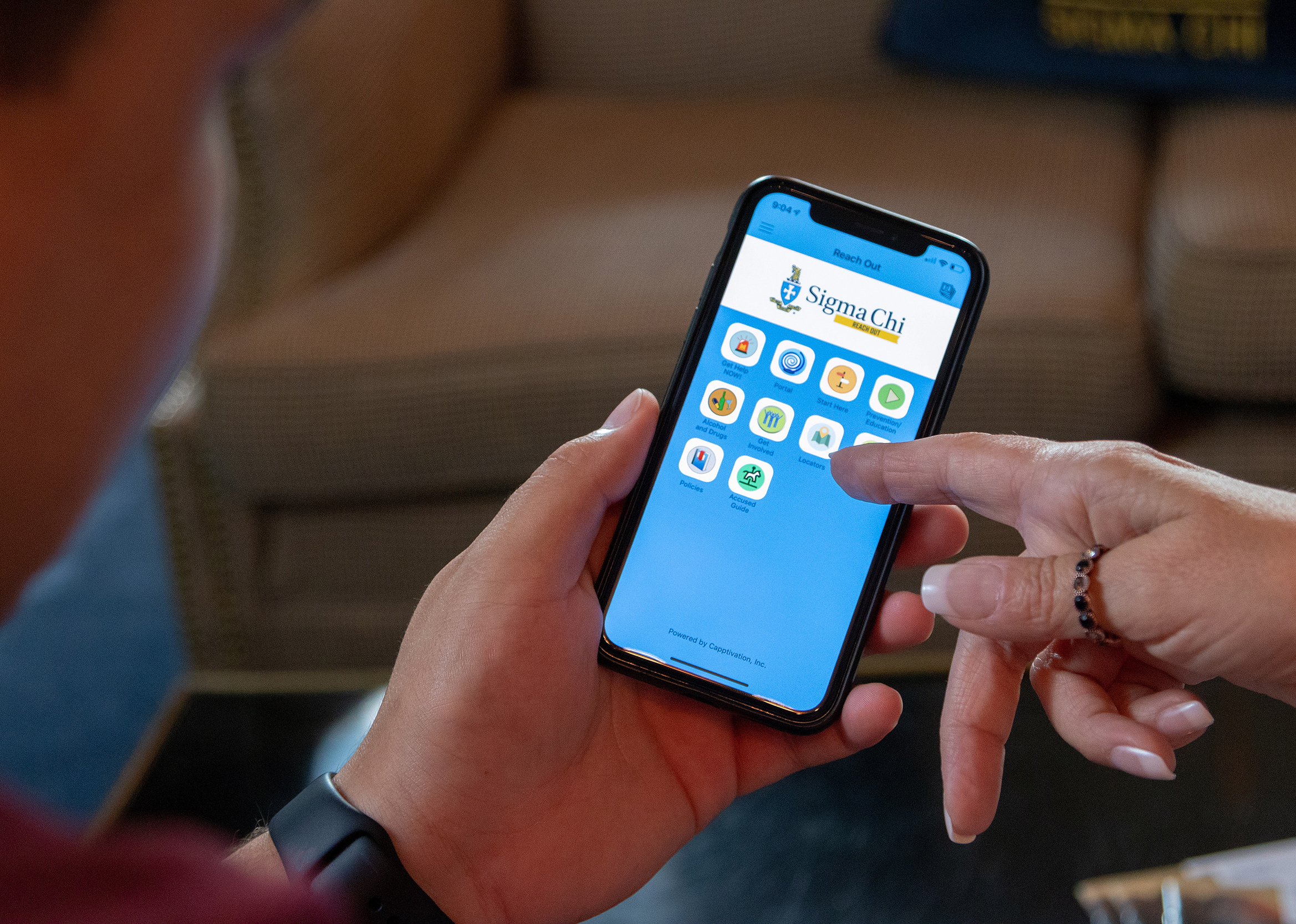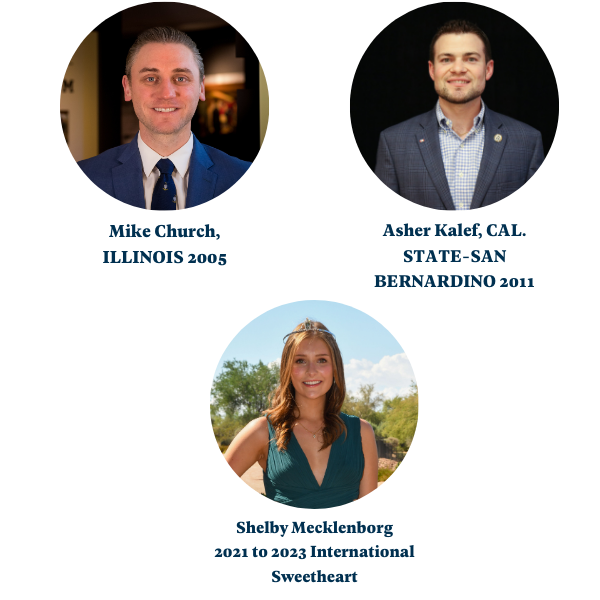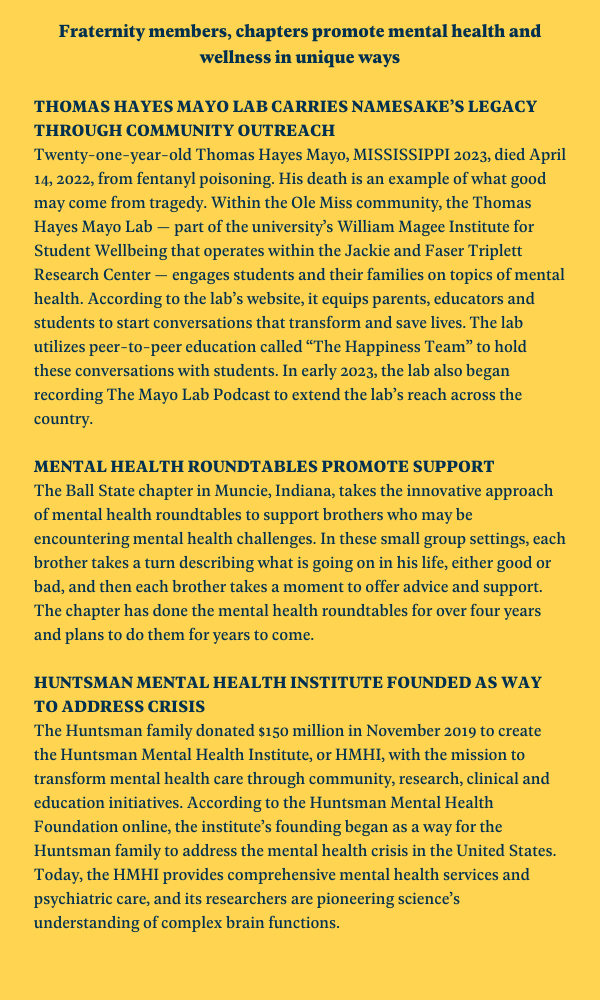Fraternity
- 1714 Hinman Ave. Evanston, IL 60201
- headquarters@sigmachi.org
- Directory

By Nathanael Hawthorne, YOUNGSTOWN 2020
In an effort to help increase the mental wellbeing of its members, Sigma Chi has implemented an annual Mental Health Action Day to promote mental health resources and help destigmatize mental health struggles in college-aged men
Sigma Chi prides itself as a leader amongst the Greek-letter world in multiple facets. One such facet is through its commitment to the mental and emotional health of its members and communities at large. Mental health struggles impact far too many individuals, including brothers, and, in terrible scenarios, those struggles end in devastating ways. Sigma Chi implemented the inaugural Mental Health Action Day, or MHAD, on Oct. 19, 2023, with the goal to distribute resources and challenge the stigma surrounding mental health and wellness.
“The Mental Health Action Day is about two things. I think it’s about calling attention to a profoundly serious matter on college campuses. All men, but particularly young men, are grappling with anxiety, depression, stress and those kinds of things that all lead to either positive or negative mental health outcomes, depending on how they’re used. The other side of it is the more that we talk about it, the more we help break the stigma around it,” says Sigma Chi Executive Director Mike Church, ILLINOIS 2005.
Under past Grand Consul Tim Sanderson, WESTERN 1985, and the Executive Committee during the previous biennium, 2021 to 2023 International Sweetheart Shelby Mecklenborg, along with others on the Health, Safety and Wellness Committee, were placed on a subcommittee to determine how to increase the wellbeing of all Sigma Chi members. Brice Wyderski, BALL STATE 2021, Max Troyke, HILLSDALE 2021, and Mecklenborg worked together with Adrian Avila, NEW MEXICO 2013, to bring the MHAD to undergraduate chapters.
“We were brainstorming ways we could make an impact,” says Mecklenborg. “There was a certain part of the Wellness Committee that was geared toward mental health. We ultimately decided on a day geared toward community engagement and raising awareness.”
The subcommittee spent nearly two years coming up with ways to make the MHAD as experiential as possible and give the undergraduate Sigs an opportunity to be hands-on. One of the ways they achieved that was through focus groups and trial and error.

Grand Praetor Asher Kalef, CAL. STATE-SAN BERNARDINO 2011, was the Executive Committee sponsor for the subcommittee and said the day started as a way to get information to the chapter houses and to the young members of Sigma Chi who may be going through mental health issues or depression.
“It was really comprehensive,” says Kalef. “We’ve clouded some of these topics because it’s uncomfortable or not cool to talk about. We teach a lot of vulnerability and openness in Sigma Chi, and we felt [MHAD] was a good place to start to let our brothers, our members and our communities in general know that it’s OK to not be OK. That’s something you should share and be able to rely on your Fraternity brothers.”
As part of the MHAD, a planning and resource guide was sent out to the undergraduate chapters, as well as press releases and a letter from 73rd Grand Consul Bob Wilson, FORT HAYS 1981, and Health, Safety and Wellness Committee Chairperson, Grand Trustee and Order of Constantine Sig Nathan Neal, GEORGE WASHINGTON 1983, outlining that Sigma Chi would be presenting the inaugural event. There was also a Mental Health Action Day speaker series in which Nick Mancini, DAYTON 2007, and others spoke about their relationship to mental health. The speaker series, hosted by the Fraternity, was critical for the success of the day, Mecklenborg believes.
“We didn’t want this to be preachy. We wanted it to be immersive and let people see the impact of what we’re doing in their lives and in the lives of people Sigma Chi’s members care about,” says Mecklenborg. “We got a lot of positive feedback about the speaker series because it was driven by questions from the undergrads, alumni and anyone tuning in. It was shaped the way they wanted it to be.”
From the Fraternity’s standpoint, it was clear that increasing the mental health of the undergraduate brothers proved to be a crucial point. On college campuses, the stigma around mental health is that men, specifically college-aged men, don’t necessarily suffer from mental health issues, or they suffer in silence often resulting in tragedy. In what Church calls an epidemic, men are more likely to commit suicide than women, according to various studies. The creation of the MHAD was a step in the right direction, he says.
“We as an organization can do a better job of helping to break the stigma around mental health,” says Church. “I think the MHAD is a good opportunity for the Fraternity to engage with our undergraduates. The inaugural Mental Health Action Day was seen as a success, and Sigma Chi is going to make greater efforts in the future to double-down on it and make sure all our chapters and members are participating in the day.”

From a Grand Praetor’s perspective, Kalef also believes the event was successful.
“A couple people have said to me directly they were glad the Fraternity was doing something about mental health. It shows Sigma Chi cares about its members health, safety and wellness, and we’re comfortable talking about things that people might not be comfortable talking about,” says Kalef. “If we encouraged even one or two of our members across the United States and Canada to say something or ask for help, then it was a success. Hopefully we can push the dial and get more of our members to come forward and be willing to talk about whatever they’re going through.”
For Mecklenborg, the day means a little more. In the years to come, she hopes to see the Mental Health Action Day synonymous with the name Sigma Chi. Her wish is for the day to be as big as the Fraternity’s Derby Days philanthropic event and have the conversation go from, “Are we going to participate this year?” to “When is it, and what are we going to do for it?”
“We ultimately want it to be taken over by the undergraduates and have them run it in a way that makes sense for them, but still hold on to that same messaging and action, as it did in the beginning,” says Mecklenborg.

